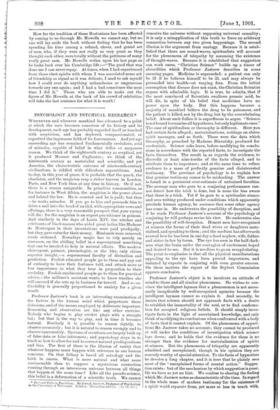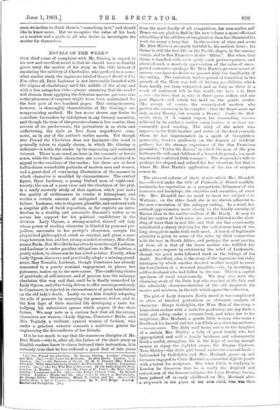PSYCHOLOGY AND PSYCHICAL RESEARCIte
WHENEVER and wherever mankind has advanced to a point at which the race becomes conscious of its history and its development, each age has probably regarded itself as touched with scepticism, and has deplored, compassionated, or regretted the ingenuous faith of its forerunners. And yet age succeeding age has remained fundamentally credulous, avid of miracles, capable of belief in what defies or surpasses reason. We think of the eighteenth century as sceptical, yet it produced Mesmer and Cagliostro ; we think of the nineteenth century as materialist and scientific, and yet America, the characteristic outcome of nineteenth-century civilisations, is riddled with ridiculous superstitions. And to-day, in this year of grace, it is probable that the quack, the charlatan, and the magician reap a richer harvest in London, Paris, and New York than at any time in history. Or if not, there is a reason assignable. In primitive communities, as for instance in West Africa, the magician is the power above and behind the law. He is courted and he is paid ; but then —he works miracles. If you go to him and persuade him to drive a nail into the head of an idol, with appropriate vows and offerings, there is a very reasonable prospect that your enemy will die : for the magician is an expert practitioner in poisons. And similarly in the days of Louis XIV. the witches and celebrants of black masses who aided great ladies like Madame de Montespan in their incantations were paid prodigally; but they gave value for their money. Husbands were removed, rivals sickened. Nowadays magic has to rely merely on unreason, on the abiding belief in a supernatural something that can be invoked to help in natural affairs. The modern clairvoyant, palmist, phrenologist, or the like, only claims superior insight,—a supernormal faculty of divination and prediction. Foolish educated people go to them and pay out of curiosity to have their fortunes told, and attach more or less importance to what they hear in proportion to their credulity. Foolish uneducated people go to them for practical advice,—the milliner's assistant wants to know whether she will succeed if she sets up in business for herself. And so on. .Credulity is generally proportioned to anxiety for a given result.
Professor Jastrow's book is an interesting examination of the factors in the human mind which perpetuate these delusions, and of the means employed by deliberate imposture. Reasoning and observation are like any other exercise. Nobody who begins tc play cricket plays with a straight bat; but that is the way to play, and in time it becomes natural. Similarly it is possible to reason rightly, to observe accurately ; but it is natural to reason wrongly and to observe inaccurately. Systems of occultism are largely built up of false data or false inferences ; and psychology steps in to teach us how to allow for and to correct natural predispositions and bias. The first of these is the illusion of vanity that whatever happens must happen with reference to our human concerns. On that fallacy is based all astrology and the faith in omens. What is more natural and what more unreasonable than to suppose a mysterious connection running through an interwoven universe between all things that happen at the same time ? Like all the pseudo-science, this belief is a deformation of a scientific truth. We cannot
• Pace and Patde in Psychology. By Joseph Jastraw, Professor of Psychology in the University of Wisconsin. London M.scaailLan and Co. 18s. Gd. net.] conceive the universe without supposing universal causality; it is only a misapplication of this truth to force an arbitrary connection between any two given happenings. The second illusion is the argument from analogy. Because it is estab- lished that there are sound-waves, spiritualists will account for the phenomena of telepathy by assuming the existence of thought-waves. Because it is established that suggestion can work cures, "Christian Science" builds up a tissue of absurdities which Professor Jastrow describes in some amusing pages. Medicine is superseded : a patient can only be ill if he believes himself to be ill, and may always be persuaded into health—at varying fees. From the initial assumption that disease does not exist, the Christian Scientist argues with admirable logic. It is true, he admits, that if the most convinced of Scientists swallows prussic acid, he will die, in spite of his belief that medicines have no power upon the body. But this happens because a majority of mankind believe the drug to be poisonous, and the patient is killed, not by the drug, but by the overwhelming belief. About such follies it is superfluous to argue. "Science is not bound to examine all hypotheses, but only legitimate ones." The case of spiritualism or theosophy is different. Here you had certain facts alleged ; materialisations, writings on slates, spirit messages, and so forth. These were the data which theosophy, as preached by Madame Blavatsky, produced for credentials. Science asks leave, before modifying its conclu- sions in accordance with the reported facts, to investigate the facts themselves. The result is, as regards the evidence, to discredit at least nine-tenths of the facts alleged, and to attribute them to imposture ; and at the same time to refuse credence to a mass of perfectly genuine and disinterested testimony. The province of psychology is to explain how that genuine testimony comes to be misleading. The answer is found in a persistent over-estimate of untrained faculties. The average man who goes to a conjuring performance can- not detect how the trick is done, but is none the less aware that there is a trick. Yet if he goes to a spiritualist seance, and sees writing produced under conditions which apparently preclude human agency, he assumes that some other agency has come in. He underrates the possibility of deception, and if he reads Professor Jastrow's account of the psychology of conjuring he will perhaps revise his view. He underrates also the possibility of self-deception. Honest men have recognised at seances the forms of their dead wives or daughters mate- rialised, and speaking to them ; and the medium has afterwards avowed how he has been in one day a dead nephew, wife, father, and sister-in-law by turns. The eye has seen in the half-dark- ness what the brain under the contagion of excitement hoped and desired to see. But it is needless to go on recapitulating. The point to emphasise is that all the physical manifestations appealing to the eye have been proved impostures, and imitated by experts in conjuring with even greater success. On these matters the report of the Seybert Commission appears conclusive.
Professor Jastrow's object is to inculcate an attitude of mind to these and all similar phenomena. He wishes to con- vince the intelligent layman that a phenomenon is not neces- sarily inexplicable by well-recognised agencies because the intelligent layman cannot so explain it. And secondly, be insists that science should not approach facts with a desire to establish the immortality of the soul, or to find confirma- tion for accepted religious beliefs. It should simply inves- tigate facts in the light of ascertained knowledge, and only think of modifying its conclusions when confronted with a body of facts that it cannot explain. Of the phenomena of appari- tions Mr. Jastrow takes no account; they cannot be produced at will under the conditions of investigation which science lays down; and he holds that the evidence for them is no stronger than the evidence for materialisation of spirits at seances. But the phenomena of telepathy are apparently admitted and unexplained; though in his opinion they are scarcely worthy of special attention. To the facts of hypnotism he devotes a long chapter, and it is here that he plainly sees most of the "unexplained forms of mental action." Sugges- tion exists : but of the mechanism by which suggestion is possi_ ble we have as yet no hint. We confess to sharing the feeling which Mr. Jastalow notes as characteristic of the time. In regard to the whole mass of modern testimony for the existence of a spirit world separate from, yet more or less in touch with,
oursr,we incline to think there is "something in it," and should like to know more. But we recognise the value of his book as a caution and a guide to all who desire to investigate the matter for themselves.







































 Previous page
Previous page